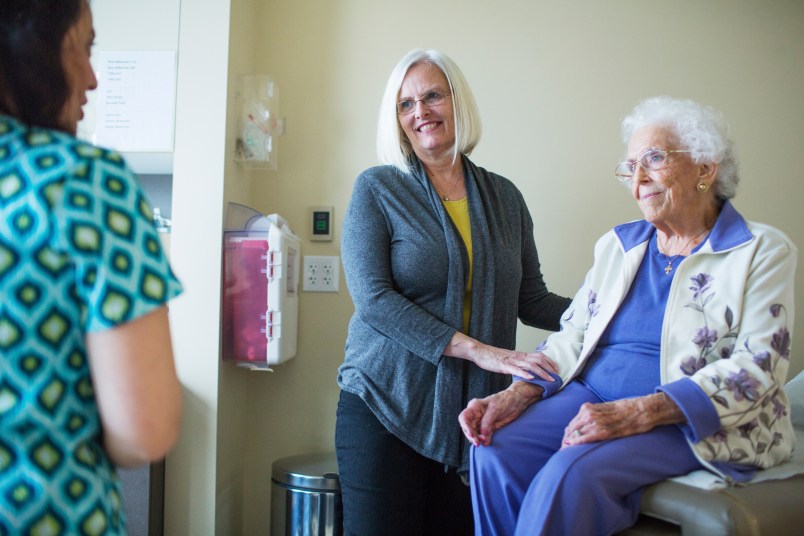What to Ask When You Accompany a Parent to the Doctor

Few of us enjoy a trip to the doctor’s office — but many adults find themselves there twice as much (or more!) when they start taking care of their senior parents. According to the Eldercare Workforce Alliance, an estimated 90 percent of adults over the age of 65 have one or more chronic condition, such as diabetes, heart disease, arthritis, depression, or hypertension. Depending on the severity, for some, taking their folks to check-ups may become a regular occurrence.
“It’s important for adult kids to accompany their parents when the adult children are serving as decision makers,” says Tammy I. Glenn, executive director of the National Volunteer Caregiving Network. “It’s especially important if the parent were to become incapacitated.”
But for a caregiver venturing into this territory for the first time, he or she may find what to ask the doctor confusing. Some aging parents may not want their independence curtailed, while others may not be able to properly advocate for themselves.
Though medical situations vary, Glenn says there are a handful of questions adult caregivers may want to be prepared to ask to ensure their parents are getting the proper care during and after each visit. “Some of the questions I ask are so that I fully understand the scope of the issue at hand,” says Glenn. “I don’t want to look back and wonder what I ‘coulda or shoulda’ done.”
Preparing for the Appointment
Doctors’ time is limited, so it’s important to do your homework before your visit. This includes talking with your parent about what your collective expectations are for the visit. Will you do most of the communicating with the doctor? Are there sensitive issues your parent feels more comfortable discussing one-on-one with the doctor? Perhaps you’ll agree to be present at the beginning and end of the appointment, which allows your parent to have some time alone with the doctor.
You’ll also want to be on the same page about what you hope to get out of the visit. Are you looking for guidance on what certain symptoms may mean, or, if you have seen this doctor before, are you there to discuss potential new medications and their side effects? Having a game plan for your visit will allow you to make the most of your time in office.
During the Visit
One of the reasons for attending a medical visit with your parent is to give the doctor much-needed background. You’re also there to pick up on your parent’s non-verbal or emotional cues that the doctor may not see.
If your parent isn’t sure how to answer a question, or seems confused, you can step in and ask the doctor to clarify. When it comes to the type of questions to raise, Glenn suggests anything that allows you to “fully understand the scope of the issue at hand. I want to know just how severe and urgent the problem is.”
These might include:
- Is this condition treatable?
- How will it progress?
- What care is needed now and in the future?
- Do I need any special equipment?
- Will he or she have to be on medication?
- Should we seek the help of a specialist?
- Is this condition hereditary?
Next Steps
At the conclusion of the appointment, Glenn recommends arming yourself with the necessary information to make appropriate medical decisions either with or on behalf of your parent.
She suggests asking:
- What are the possible outcomes of this visit?
- What should we expect to happen next?
- If we have concerns, what should we do and who should we call?
- Is there anything we haven’t explored with you today that we should be considering?
Once home, you may want to compare notes to make sure there aren’t any lingering questions or issues. Ask your parent if they think you did a good job. You may find that you spoke up too much, or too little. This may mean tweaking how you approach medical visits with your parent.
“Staying informed about your parents’ choices and desires is the compassionate and respectful approach,” says Glenn. “If there’s any chance of getting out in front of a challenge or if we can anticipate needs, advance planning makes a world of difference.”
More From FIRST
How to Be a Good Middle-Aged Daughter to an Aging Parent
What Women in the Sandwich Generation Often Miss About Their Own Happiness
Caregiver Burnout: 13 Real Women on How They Deal With Sandwich Generation Stress













